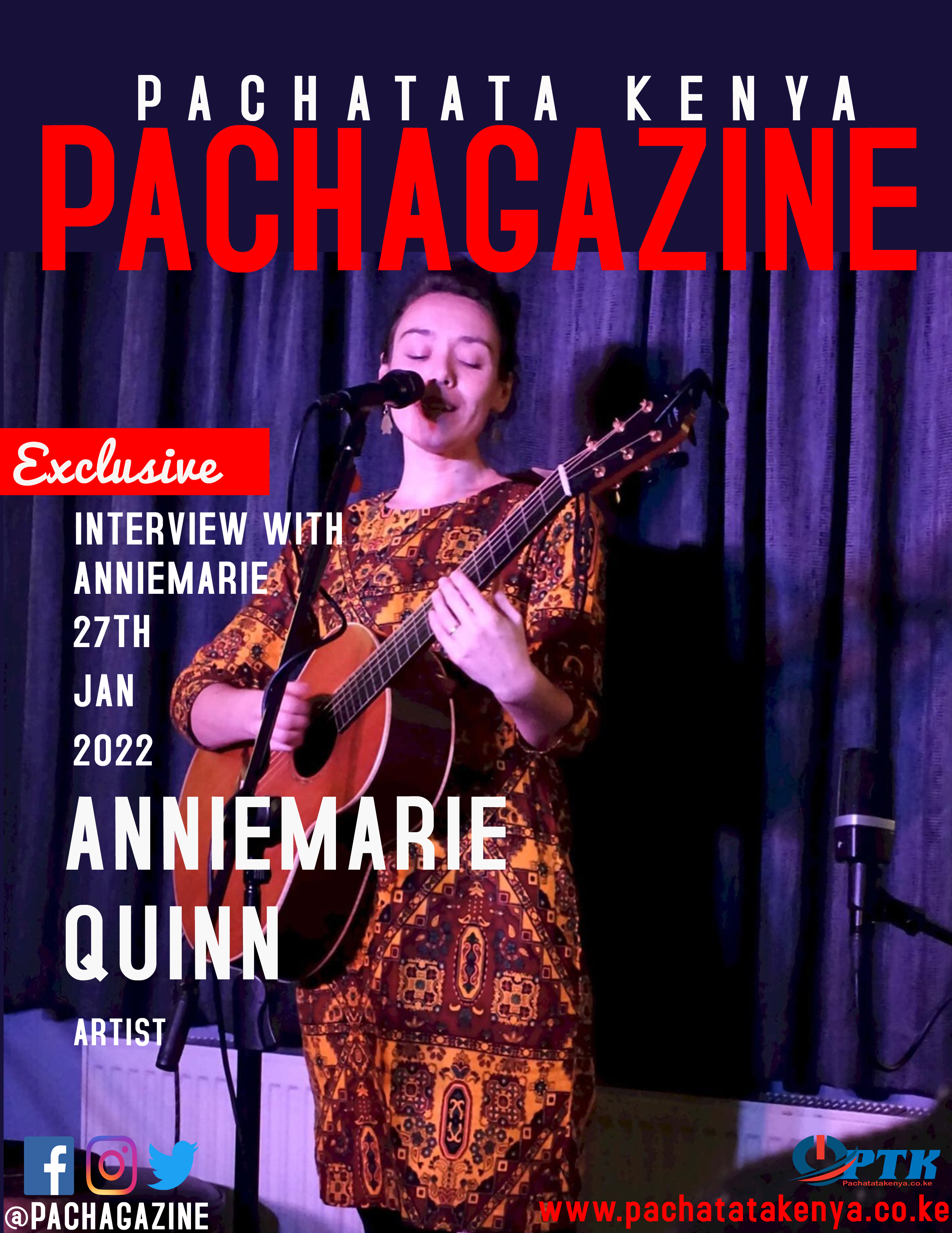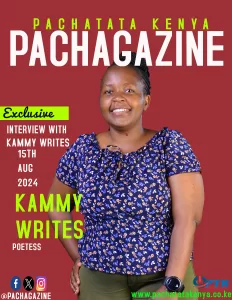
Starting music at the age of 7, to performing her first gig at the age of 14, Annemarie Quinn, a songbird from the U.K, graduated from Manchester Metropolitan University with a First Class Degree in Music. She has performed at a number of venues and festivals around the U.K, and regularly featured on BBC.
In 2016 she and her husband decided they wanted a change, so they packed up their life and moved to Malawi, Africa! From the moment she arrived with her guitar, she dived straight into the country’s music industry, where she was for 5 years composing, collaborating and recording with the most amazing Malawian musicians to create her album, Blue Sky Thinking Album.

What first got you in to music?
I’ve always loved music. I grew up in a home that was filled with music, all day everyday! My parents would always have the radio or CDs playing, I grew up surrounded by the likes of Paul Simon, U2, Bob Marley, The Drifters, Bruce Springsteen – our house was never quiet.
I took up the violin at the age of 7 and began singing in my school choir. Even at such a young age, I found music to be such a release and a way to express myself.
I’ve always been fascinated by how something so emotive and beautiful can’t be seen, but only heard – this made me want to explore further.
I studied music through school, took as many instrument lessons as I could get, and I just knew that this was what I wanted to do.
I then went on to study music in university and learnt so much – and that’s the thing – we never stop learning. I think sometimes people think that if they’ve learnt an instrument, then ‘that’s it! I don’t have to practice anymore!’ But the truth is, we should never stop pushing ourselves to learn. Moving to Malawi has taught me so much, both in my personal and professional life. I’ve listened to chord progressions, harmonies and rhythms that I’ve never heard before, and welcomed it into my compositions – it’s been wonderful!
What or whom would you say has been the most important influence when it comes to your music?
The most important thing is to be open minded – I remember my guitar teacher telling me to listen to all different kinds of music; whether you like it or not, it’s important to form critical opinions rather than just ‘this sounds good, this sounds bad’. There’s something to be learnt from all different genres of music, so listen to as much as you can!
As I mentioned, my parents played the most awesome music to me which definitely had a subconscious effect on me. My all-time favourite musician has to be Paul Simon. My Dad is a huge fan, so we’d always listen together. Paul Simon’s ‘Graceland’ was my soundtrack growing up; at the time I loved it, but had no idea just how much of an inspiration it would be to me. ‘Graceland’ is still to this day, my most favourite album. That’s what’s amazing about music; each part of your life can be mapped by the songs you were immersed in at the time, and as soon as you listen to them, you’re transported back to that moment.

As someone who studied Classical Music,how would you advise upcoming artists who would like to follow your foot steps?
For me, music is a balance between natural talent and studies. Formally studying music is brilliant, especially music theory, as you’re able to understand not only what you’re playing, but why the notes fit together, allowing your compositions to progress. But studying can only take you so far; passion and talent is also needed! I’ve seen the most incredible musicians in Malawi who can’t read a single note of music, yet they’ve managed to build themselves a guitar from an oil can and bicycle brakes and have taught themselves chords. How amazing! But often without music theory, it can be difficult to progress further. So for me I think it’s important to have a balance of both elements, which then allows the other to excel. Nature vs. Nurture – that’s a difficult one. Don’t get me wrong, I think you can have a natural talent, but unless you nurture and develop it, there’s only so far you’ll go. I’ve always loved music and sure, it came naturally to me, but I’ve worked SO hard over the past 15 years to get to where I am now. Extra classes, self-studies, revision, exams, there’s so much that’s needed to help yourself grow and succeed, other than just ‘talent’.
What inspired you to take the leap of faith in 2016 and move to Malawi ?
We just wanted a change! We were living in a part of UK that had recently flooded with bad rains so we just thought, why not, if we don’t try, we’ll never know. I visited The Gambia when I was 17 years old on a school trip and was totally blown away. I fell in love with feeling out of my comfort zone and experiencing new cultures. I always knew I’d love to go back to Africa at some point! My husband, Andy, who teaches at an International School in Malawi, had never been to Africa before, so we just went for it and have zero regrets! But I really do believe everything happens for a reason, and you make your own luck. We’ve had a brilliant time here in Malawi, but we’ve put a lot of hard work in too, and made sure we’ve made the most of every opportunity – life is what you make it.
Tell us About your charity programme music against malaria?
I am a co-founder of the NGO, Music Against Malaria, working with Musician Code Sangala, to raise funds and awareness in the fight against Malaria, whilst promoting and preserving the cultural heritage of Malawi. It’s an absolute honour to contribute what I can to this work.
Whilst living in Malawi, I felt it is important to help in a sustainable way, rather than handouts or quick fixes. I was first introduced to Jacaranda School For Orphans in 2017 after visiting and performing at Jacaranda Cultural Centre (JCC is linked with the school and helps to raise funds for them). I visited the school and was totally blown away by the work they do. Straight away I knew I just had to get involved and help with the music programme, it’s the least I can do whilst I’m living here. I worked with the Jacaranda students, teaching music theory, guitar and violin, song writing and vocal training. The students have the most amazing voices, and it’s been such a privilege to have them sing on my album. Back to the nature vs. nurture comment – these children have the most incredible natural talent, I don’t ever want to alter that, all I have done is given them the tools and knowledge to further themselves and pass these skills on to other students, creating a sustainable model.
Recording with Lusubilo Band on the shore of Lake Malawi
You have a few notable Malawian artists such as Faith Mussa on the list of people you have collaborated with. How much of an influence do you think this has had on the overall sound of Blue Sky thinking?
I really wanted to take my time with this album and get to know musicians, rather than just a feature. I feel like I’ve made some great friends throughout the recording, and I’m so grateful to each and every artist. Blue Sky Thinking features over 40 musicians including Faith Mussa, Code Sangala, Lusubilo Band, Agorosso, Goma Nyondo, Kennedy Phiri, Jacaranda School For Orphans, Patrick Chimbewa, amongst others. Rather than just diving straight into the music, I took the time to get to know musicians – we met for jam sessions, hung out and played gigs together. I fee that that’s when the true collaboration comes; when everyone feels comforatble with each other. I’ve felt so welcomed into Malawi’s music scene, it’s been an honour to have worked and performed with such amazing musicians. People have reached out from all over the country to let me know how much they enjoy my music, and it means so much to me to hear that. I’ve tried my best to make my music accessible to both Malawian and international audiences, I’ve even added some Chichewa in my album too, with one of my tracks titled ‘Osadandaula’!
In rehearsals with Faith Mussa
I’ve always been aware of cultural appropriation – I didn’t set out to write an album that sounds ‘African’ – I’m a British, so why would I do that?! Haha! But rather to explore and create a balance between my singer songwriter sound with a flare of the Malawian vibe. When I started explaining this idea to people, I was met with nothing but love, encouragement and enthusiasm by the Malawians. The artists I’ve collaborated with are all so different, but equally inspiring. They’ve brought ideas and created parts I never could have imagined. I sometimes feel collaboration is seen as a sign of weakness, that you can’t do it on your own. But I believe this couldn’t be more wrong, we are stronger and more efficient together. It’s been amazing to watch these musicians bring their own flare, styles and ideas to each piece of the album, I’m so grateful to every single artist that has been a part of Blue Sky Thinking, it’s been a celebration of merging cultures; we had the most amazing time creating it, and I hope you can hear that in the music!
Tell us about Blue Sky Thinking ?
Blue sky Thinking
‘Blue Sky Thinking’ means, to always look for the positives, a dedication to the incredible determination, optimism and innovation of Malawians I’ve had the honour of experiencing whilst living there.
Blue Sky Thinking’ is an album bringing together a wide and talented range of Malawian musicians to inspire, collaborate, compose, perform and record; a rare opportunity for a British singer-songwriter Anniemarie Quinn to be fully immersed into a country’s culture for four incredible years.
Featuring over 40 musicians, Blue Sky Thinking is a four years of experience, emotion and the total immersion into a country’s culture, connecting and merging humans from all walks of life.
Blue Sky Thinking has been shaped by the bustle of a thriving Malawian market, the beats of a bao game, the sunsets over the national parks, choirs singing on the back of pick-up trucks and the constant push and pull between loving this amazing country and respecting its culture whilst staying true to her own.
Shakers crafted from deodorant bottles and seeds, brass recorded on the shores of Lake Malawi, home-made traditional instruments and incredible musicians including Faith Mussa, Lazarus and The Jacaranda School For Orphans’ Choir, come together to bring a flare of Malawian sound to a singer songwriter’s vibe, creating this one of a kind album.
Every song has a meaning, each recording session has a story of some kind, ones of laughter, friendships and struggle, transport breaking down, power cuts, musicians unable to make the session due to malaria, and some turning up with malaria and recording anyway – you name it, it happened!
1.SIZE OF THE SKY
When I first arrived in Malawi I noticed the size of the sky – it’s vast, the bright sunshine and it’s horizon stained with red dust. Five years on I am still in awe of the sky. I wanted this piece to capture that feeling you get when you arrive in a brand new country when you step off the plane – the heat rising off the tarmac, the smell of the air and a brand new culture to explore. Embracing the feeling of being out of your comfort zone – I love it! I wanted a big song to start the album with, a hit of sound, just like how the Malawian culture hits you – it’s consuming and emotional- “Stepping out, just outside these walls, there’s a world that sings only the brightest sounds”.
2. OSADANDAULA
I wanted to write a song with a strong hook line that no matter your background, culture or language everyone could sing together. There were often shows I played at the beginning where the language barrier was difficult as I was still learning Chichewa and felt I couldn’t connect with the audience. This song helps to breaks these barriers down with the line “Hey, Osadandaula” everyone can sing, which means ‘don’t worry’ worry – the Malawian version of Hakunamatata!
3. OUT LOUD
This song is the only track on the album that I didn’t write in Malawi! I actually composed this song when I was 19 years old about the importance of speaking for feelings and staying true to yourself.
4. WHERE YOU BELONG
I was inspired to write this song from a conversation I had with a musician. I was talking about missing home and I remember him saying ‘be where you are now’.
It really stayed with me and got me thinking- it’s hard to be away from friends and family for such a long time and I miss home every day, but this is the path I have chosen for the moment, so embrace it and make the absolute most of it – then it makes it worth being away from everyone.
5. BLUE SKY THINKING
The song features Waliko Makhala on spoken word – in Chichewa he speaks in the importance of collaboration and how we must think without limits- the meaning of Blue Sky Thinking!
6. TELL ME OF A TIME
“Tell Me Of A Time” allows a moment of rest in the middle of the album, something that I’ve tried to do whilst living in Malawi – step back, take a moment to reflect and then carry on.
7. LIKE YOU MEAN IT
“Like you mean It” was a challenge to record – the song naturally speeds up and slows down so we didn’t record to a metronome.
8. THEN WE’RE HOME
9. TIKALE PANOPA
10. RHYTHM AS THEY RUN
11. ONE MORE STEP
12. NKHANI YHATU
13. USIKU OKONGOLA
14. TIGOWANE [LIVE]
How can people find you or your music on social media?
Via my website website, www.annemariequinn.co.uk and via Twitter, Facebook and Instagram – @AnnemarieQuinn






